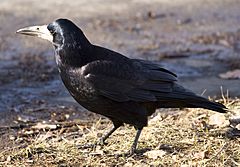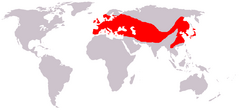Rook facts for kids
Quick facts for kids Rook |
|
|---|---|
 |
|
| Conservation status | |
| Scientific classification | |
| Kingdom: | |
| Phylum: | |
| Class: | |
| Order: | |
| Family: | |
| Genus: | |
| Species: |
C. frugilegus
|
| Binomial name | |
| Corvus frugilegus |
|
 |
|
| Rook range | |
The rook (Corvus frugilegus) is a clever bird. It belongs to the crow family. This family is part of the Passerine group, which includes many songbirds. Rooks are known for being very social.
Contents
Discover the Rook Bird
Rooks are fascinating birds. They are often seen in groups. These birds are known for their intelligence and their unique way of life.
What Does a Rook Look Like?
Rooks are about the same size as a crow. They have shiny black feathers. In bright sunlight, these feathers can look blue or even purplish.
The feathers on their head, neck, and shoulders are thick and soft. Their legs and feet are usually black. The beak, also called a bill, is grey-black.
Adult rooks are special because they have bare, grey-white skin. This skin is found around the base of their bill and in front of their eyes. This bare patch helps tell them apart from crows. The feathers around their legs also look a bit shaggier than a crow's. Young rooks do not have this bare patch. So, they look very much like crows.
What Do Rooks Eat?
Rooks mostly eat earthworms and insect larvae. They find these tasty snacks by poking their strong bill into the ground.
They also enjoy eating cereal grains from farms. Sometimes, they eat small amounts of fruit. They might even snack on small mammals or acorns. Rooks can also eat small birds, their eggs, and young birds. They will even eat carrion, which is dead animal meat.
Where Do Rooks Live and Nest?
Rooks are very social birds. They always nest together in groups. They usually build their nests high up in the very tops of trees.
They break off branches and twigs from trees to build their nests. You might see many nests together in one group of trees. Twenty or thirty nests are often found in a single rookery. A rookery is the name for a group of rook nests. Because they live and nest in such large groups, rooks are called colonial birds.
 | Janet Taylor Pickett |
 | Synthia Saint James |
 | Howardena Pindell |
 | Faith Ringgold |


